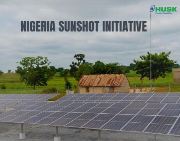Husk Power Systems, a net-zero energy company serving rural Africa and Asia and operator of the largest fleet of community solar-hybrid microgrids, announced its “Nigeria Sunshot Initiative”, a multiyear effort to benefit at least 2 million Nigerians with reliable, renewable energy by 2026.
The initiative consists of a three-part strategy: 1) demonstrating accelerated microgrid deployment at scale, 2) improving livelihoods by providing financing for the purchase of energy efficiency appliances (for both households and MSMEs) and 3) catalyzing greater local socio-economic development by rolling out productive use activities, including agri-processing and cold storage.
“Husk Power will do its utmost to support federal, state and local governments to deliver on Nigeria’s goal of universal electrification by 2030,” said Olu Aruike, Country Manager of Husk Nigeria. “With more than 90 million Nigerians still living without access to energy, the Nigeria Sunshot is a real-world demonstration that the microgrid industry is ready to scale and drive rural economic growth with a net-zero, resilient solution.”
Key goals of the Nigeria Sunshot include:
· Building at least 500 microgrids by 2026
· Establishing 400,000 connections that benefit over 2 million people
· Taking at least 25,000 diesel and gasoline generators offline
· Providing affordable energy to 8,000 women-led business customers
· Electrifying 700 public health clinics and 200 private hospitals, and 100 public schools
According to recent Nigerian government data, solar microgrids represent the least-cost technology for 8.9 million of the 19.8 million additional connections needed in the country to achieve universal electrification. Under the Sunshot Initiative, Husk will be able to provide about 5% of those connections, and impact 1% of the total Nigerian population.
In late 2021, Husk became the first company to commission multiple microgrids at once in Nigeria, clearly demonstrating the ability to scale. Husk expects to end 2022 with more than 20 microgrids in operation.
Besides its presence in Nigeria and Tanzania, Husk is also in discussions to enter multiple new markets in Sub-Saharan Africa. By scaling in Nigeria, Africa’s largest economy, Husk will be able to expand and achieve even greater impact. Overall, Husk committed in a 2022 UN Energy Compact to build 5,000 microgrids by 2030.

